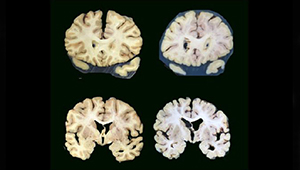Rod Walker, MS
Biography
Rod Walker, MS, has developed a diverse research portfolio in his 10+ years working as a biostatistician at KPWHRI. His varied interests have led to collaborations in women's health, cancer, aging and geriatrics, pharmacoepidemiology, opioids research, and mental health. During his tenure he has served as an analyst for the Statistical Coordinating Center for the National Cancer Institute's Breast Cancer Surveillance Consortium, evaluated the impact of health system initiatives to reduce risk associated with chronic opioid therapy prescribing, and investigated potential associations between different medications classes and a wide range of outcomes such as pneumonia, fall-related injury, and dementia.
One of Mr. Walker’s longest-running collaborations is with the Adult Changes in Thought (ACT) study, an ongoing longitudinal cohort study seeking to bolster knowledge of risk factors related to dementia, Alzheimer's disease, and healthy aging. As this project and related studies have grown, he has contributed to analyses of associations between medication use and laboratory values and cognitive outcomes within this cohort of older adults, extended this research to associations with neuropathology measures among autopsied individuals, and helped process and analyze activity monitoring data generated from devices worn by ACT participants. Continued collaboration with ACT-related investigators is a highlight of his research at KPWHRI, as the ACT study provides many avenues for increasing public health knowledge of issues relevant for older adults.
A relatively new area of collaboration for Mr. Walker is with researchers from the Mental Health Research Network seeking to use information captured in electronic health records to predict risk of suicide attempt and suicide death. He has appreciated learning from other investigators and biostatisticians on this project, expanding his knowledge in machine learning and risk prediction, as well as in potential issues surrounding health informatics and implementation of tools into clinical workflows. He looks forward to continued opportunities within this research area to address important public health issues in mental and behavioral health.
Research interests and experience
-
Biostatistics
Survival and longitudinal data analysis; epidemiology; machine learning; two-phase sampling
-
Aging & Geriatrics
Biostatistics; cognitive health and dementia; neuropathologic correlates of dementia; factors associated with healthy aging
-
Mental Health
Biostatistics; suicide risk prediction; interventions for risk reduction; machine learning and health informatics
-
Medication Use & Patient Safety
Biostatistics; pharmacoepidemiology; medication safety in older adults; opioids and chronic pain
-
Health Informatics
-
Women's Health
Recent publications
Bellettiere J, Tuz-Zahra F, Carlson JA, Ridgers ND, Liles S, Greenwood-Hickman MA, Walker RL, LaCroix AZ, Jankowska MM, Rosenberg DE, Natarajan L Agreement of sedentary behaviour metrics derived from hip-worn and thigh-worn accelerometers among older adults: with implications for studying physical and cognitive health 2021 Mar;4(1):79-88. doi: 10.1123/jmpb.2020-0036. Epub 2021-02-16. PubMed
Kumar RG, Jayasinghe N, Walker RL, Gibbons LE, Power MC, Larson EB, Crane PK, Dams-O'Connor K Association of remote traumatic brain injury and military employment with late-life trajectories of depressive symptom severity 2021 Feb 15;281:376-383. doi: 10.1016/j.jad.2020.12.003. Epub 2020-12-05. PubMed
Zhou J, Walker RL, Gray SL, Marcum ZA, Barthold D, Bowen JD, McCormick W, McCurry SM, Larson EB, Crane PK Glucose-Dementia Association is Consistent Over Blood Pressure/Antihypertensive Groups 2021 Jan;80(1):79-90. doi: 10.3233/JAD-201138. PubMed
Rosenberg D, Walker R, Greenwood-Hickman MA, Bellettiere J, Xiang Y, Richmire K, Higgins M, Wing D, Larson EB, Crane PK, LaCroix AZ Device-assessed physical activity and sedentary behavior in a community-based cohort of older adults 2020 Aug 18;20(1):1256. doi: 10.1186/s12889-020-09330-z. Epub 2020-08-18. PubMed
Dublin S, Walker RL, Floyd JS, Shortreed SM, Fuller S, Albertson-Junkans LH, Harrington LB, Greenwood-Hickman MA, Green BB, Psaty BM Renin-angiotensin-aldosterone system inhibitors and COVID-19 infection or hospitalization: a cohort study 2020 Jul 7 doi: 10.1101/2020.07.06.20120386. PubMed
Research

COVID risks not meaningfully greater with estrogen-containing medications
Oral contraceptives, hormone therapy not linked to more severe COVID outcomes.
Research

Traumatic brain injury raises risk of brain atrophy
Study suggests pathology of brain cell loss after traumatic head injury is distinct from Alzheimer’s disease.
New findings

Simpler models to identify suicide risk perform similarly to more complex ones
Models that are easier to explain, use could have better uptake in health care settings.



